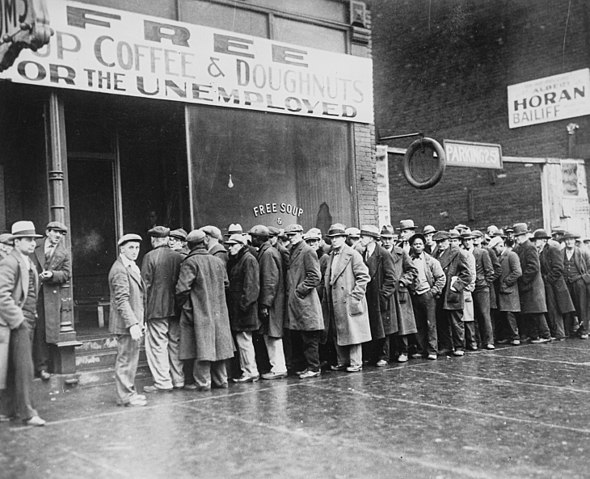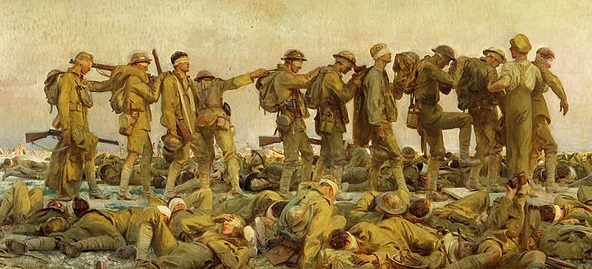
The Fountainhead, part 2, chapter 15
Howard Roark has once again fallen on hard times:
Roark’s office had shrunk back to one room. After the completion of the Cord Building he found no work. The depression had wrecked the building trade; there was little work for anyone; it was said that the skyscraper was finished; architects were closing their offices.
…When Roark tried to get a commission, he was rejected in a manner implying that if he had no more sense than that, politeness would be a wasted effort. “Roark?” cautious businessmen said. “The tabloid hero? Money’s too scarce nowadays to waste it on lawsuits afterwards.”
After the Stoddard lawsuit, most potential clients won’t touch Roark with a ten-foot pole. This is exactly what Ellsworth Toohey schemed to achieve. However, did you notice the other reason why the building trade has dried up?
The text makes an offhand reference to “the depression”. Yes, that would be the Great Depression, that generation-defining catastrophe that still resonates in America’s national consciousness. Even those of us who were born long after the Great Depression can recognize its cultural imagery: the Black Tuesday stock-market crash, Wall Street brokers leaping from windows, Dust Bowl farmers packing their families into trucks, hobos riding the rails, apple sellers, bread lines, bank panics, Hoovervilles, FDR’s fireside chats, the New Deal.
The Fountainhead is set in the 1920s and ’30s. The Great Depression ought to be everywhere in evidence, overshadowing everything else that happens. It ought to be something the characters constantly have to contend with, something that shapes every decision they make.
But it’s not. This is the only acknowledgement of it in the whole book.
As with the Roaring Twenties and Prohibition, Ayn Rand is totally uninterested in the culture of the era she set her story in. She doesn’t consider any of these world-changing events worth mentioning, except when they affect her main characters, and hardly even then. To her mind, the Great Depression is nothing but vague background, like a city skyline painted on wooden boards behind the actors in a play.
Obviously, not every historical novel has to be a period piece rich with verisimilitude. But you get the sense that Rand’s relegating the Great Depression to background wasn’t a conscious stylistic choice, so much as she thought it was irrelevant. She didn’t care about the human suffering or despair it caused, only about the way it inconvenienced Howard Roark because he had to step over people sleeping on the sidewalk on the way to the office.*
The next section is a little surprising. What Roark is doing in his spare time, it turns out, is financially supporting Steven Mallory:
The Stoddard award had taken more than the amount of his fee for the Cord Building. But he had saved enough to exist on for a while. He paid Mallory’s rent and he paid for most of their frequent meals together.
Mallory had tried to object. “Shut up, Steve,” Roark had said. “I’m not doing it for you. At a time like this I owe myself a few luxuries. So I’m simply buying the most valuable thing that can be bought — your time. I’m competing with a whole country — and that’s quite a luxury, isn’t it? They want you to do baby plaques and I don’t, and I like having my way against theirs.”
…Austen Heller heard about it from Mallory, and spoke of it to Roark in private.
“If you’re helping him, why don’t you let me help you?”
“I’d let you if you could,” said Roark. “But you can’t. All he needs is his time. He can work without clients. I can’t.”
Roark insists that this isn’t altruism because he enjoys buying Mallory’s time, because he takes pleasure in “competing with a whole country” and winning. This fits with the view of luxury in Atlas Shrugged, where the appeal of being rich is that you get to keep valuable things to yourself and shut them away from the unworthy gazes of the poor; as when Hank Rearden said that beautiful flowers were “wasted” if they were in a florist’s window where the unwashed masses could appreciate them.
However, if Objectivism can justify giving someone free money and getting nothing in return, just because you like having your own way and not forcing them to deal with anyone else to earn a living… what can’t it justify?
As with Ragnar Danneskjold, whose “selfish” plan was to risk his own life on behalf of others, Rand’s philosophy, which supposedly advocated all-selfishness-all-the-time, is flexible enough to allow almost anything as long as you can imagine some way to call it a “rational” choice. Even the other characters note the implicit contradiction:
“It’s amusing, Howard, to see you in the role of an altruist.”
“You don’t have to insult me. It’s not altruism. But I’ll tell you this: most people say they’re concerned with the suffering of others. I’m not. And yet there’s one thing I can’t understand. Most of them would not pass by if they saw a man bleeding in the road, mangled by a hit-and-run driver. And most of them would not turn their heads to look at Steven Mallory. But don’t they know that if suffering could be measured, there’s more suffering in Steven Mallory when he can’t do the work he wants to do, than in a whole field of victims mowed down by a tank? If one must relieve the pain of this world, isn’t Mallory the place to begin? … However, that’s not why I’m doing it.”
Just imagine the awesome arrogance it took to write that sentence. Rand is saying that, if Steven Mallory can’t sculpt the kind of statues he wants to sculpt and has to make cheap tchotchkes to earn a living, his suffering is objectively worse than a street full of people crushed by tanks. Alleviating that suffering is more important than helping anyone else who’s in pain or in need: hungry families, abused wives, kids with cancer, war refugees, disabled veterans.

And this is in the same chapter where we read about how evil it is to establish a care home so that severely disabled children have somewhere to live! Their suffering doesn’t even rate a mention in the author’s mind, compared to the grave injustice of an artist having to do commercially viable work. If it was a choice between keeping the Stoddard Temple as is, versus giving it to Mallory to use as a studio and throwing all those disabled kids out into the street to starve, is there the slightest doubt which option Ayn Rand would pick?
What this really comes down to is that, to Rand, your feelings and desires only matter if you’re a follower of her philosophy. If you’re an Objectivist, you matter more than other people, and you’re entitled to do whatever you want: cheat, lie, steal, kill, break any laws that stand in your way, and generally act like a comic-book supervillain.
The second part of The Fountainhead ends with a brief scene where Roark goes to see his mutilated temple. He’s not sure whether it’s to torture himself or to prove that he can stand the sight:
It was late and the garden of the Stoddard Home was deserted. The building was dark, a single light showed in a back window upstairs. Roark stood looking at the building for a long time.
The door under the Greek portico opened and a slight masculine figure came out. It hurried casually down the steps — and then stopped.
“Hello, Mr. Roark,” said Ellsworth Toohey quietly.
Toohey admits he’s been hanging around the building, inventing one excuse after another to be there, just because he was sure Roark would eventually come to see it and Toohey wanted to be there to witness his reaction.
He insists that he, more than anyone else alive, understands the meaning of Roark’s work (“You haven’t many people around you who can say that. It’s a greater bond than if I were your devoted, but blind supporter”). In return, he asks if Roark understands what Toohey did to the building and why (“You who know the language of structure and the meaning of form. Do you see no purpose here?”), to which Roark responds with a noncommittal grunt.
“Mr. Roark, we’re alone here. Why don’t you tell me what you think of me? In any words you wish. No one will hear us.”
“But I don’t think of you.”
If Toohey was hoping to see Roark miserable so that he could gloat, this isn’t what he wanted to hear. He seems disappointed, and he walks quietly away leaving Roark alone.
For the record, this is the only time that the ostensible hero and the ostensible villain of this novel interact. It’s supposed to be a devastating putdown, that Roark considers Toohey such a contemptible little pipsqueak that he doesn’t consider it worthwhile to spend even a moment thinking about him. But it falls a little flat in light of the fact that Toohey has been very successful at damaging Roark’s career and will continue to be a dangerous and effective enemy for the remainder of the novel. Under the circumstances, refusing to take any action against him seems like a willful effort on Roark’s part to evade unpleasant truths.
* It’s also possible that Rand didn’t dwell too much on the Depression because that would mean admitting that FDR’s New Deal (which she hated) helped to end it.
Header image credit: Wikimedia Commons; mid-post image via
Other posts in this series: